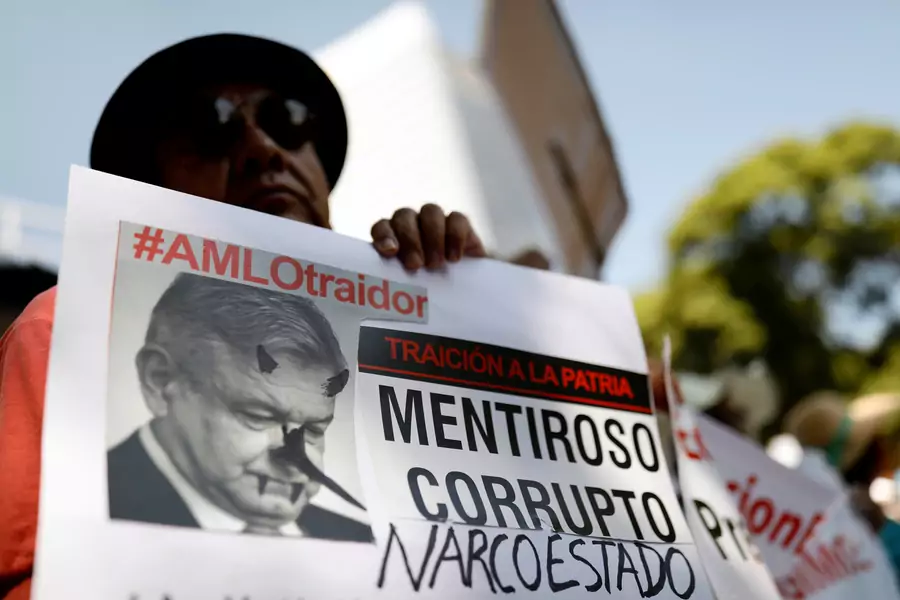Mexico’s Lopez Obrador Is Stoking Corruption, Not Fighting It

“Corruption is a bigger threat to Mexico than organized crime.” So says President Andres Manuel Lopez Obrador. He asserts that under his watch “corruption has ended, [officials] will no longer steal.” He took Mexico’s recent one notch rise in Transparency International’s rankings, now besting Russia (though still below Ukraine, Pakistan, and Gabon), as vindication. Yet on corruption, voters’ hopes and the president’s rhetoric seem to have left rationality and reality behind. Not only has his administration overlooked high-profile cases of public graft, it is dismantling the institutions that could make Mexico more transparent and accountable.
Corruption hits Mexico hard. Surveys show one in three Mexicans pay a bribe every year for basic services, nearly half of businesses say they lost out to others offering kickbacks. This takes an economic toll, estimated at some 9% of gross domestic product. Corruption resonates with voters too, topping their concerns. Indeed, it helped to launch Lopez Obrador into office.
More on:
But members of his inner circle seem prone to wrongdoing. Electricity sector head Manuel Bartlett failed to report nearly two dozen luxury homes he owns in Mexico City worth more than $40 million. Senator Napoleon “Napito” Gómez Urrutia, a former labor leader, now travels by private jet, while his son posts YouTube videos of his Mercedes, Porsches, Land Rovers and other luxury cars. And despite his son’s lack of professional experience, he’s jumping into the mining and energy businesses, economic sectors that his father oversees. The head of Lopez Obrador’s political party claims to have “made an accounting error” when filing her 2013 taxes, one that saved her $850,000 in the process.
Government graft seems to go beyond a few “bad apples.” Lopez Obrador’s flagship apprenticeship program for more than 2 million young people is riddled with fake registrations and repeated names, phantom businesses and addresses, and real companies that had no idea they were enrolled or supposedly hosting grantees. Meanwhile, one-third of the program’s $2 billion budget last year looks to have disappeared into the administration’s discretionary trough.
The government remains vulnerable, if not drawn, to fake public contractors: Imaginary medical equipment providers paid to supply public clinics, a nonexistent construction company hired to rebuild a Sonora highway, and fake cleaning services and caterers altogether raked in more than $6 million last year.
The opacity of the past also continues: More than 3 out of every 4 public contracts are awarded in a “no-bid” process. One of the biggest deals so far pays billionaire Ricardo Salinas Pliego, one of Lopez Obrador’s backers, to supply debit cards to distribute government social program funds. And the government has classified the feasibility studies and contract and payment details for the new Santa Lucia airport, a Yucatan train, and other big infrastructure projects.
The processes and institutions intended to take on corruption are in a shambles. Federal comptroller Irma Sandoval recently ruled that Bartlett’s fancy digs weren’t an issue as they weren’t bought during his current job (even though he has been in public office for years) and were not in his but in his family members’ names. She seems nonplussed by the potential conflict of interest of family businesses crossing political lanes. The head of Lopez Obrador’s financial investigations unit too seems more interested in going after political enemies (for instance, freezing former supreme court justice Eduardo Medina Mora’s bank accounts just long enough for him to resign) than taking a hard look at friends.
More on:
The National Anti-Corruption System, created by a 2015 set of constitutional and legislative reforms, is all but dead. Lopez Obrador has ignored it from the start, and hasn’t appointed officials to operate its main tribunal. The Supreme Court struck down the capital city’s anti-corruption system; in other states many efforts remain poorly funded or dependent on local political bosses. Some states have yet to put in place rules requiring political candidates to release their tax returns and report their assets; in other states with such rules, aspiring officials have mostly ignored them.
Government austerity measures have taken a stiff swipe at the justice system. The Attorney General’s budget was slashed nearly $80 million, and other agencies and courts also lost tens of millions of dollars.
Moreover, Lopez Obrador’s administration is systematically weakening the independence of the judicial system. The executive branch has taken control of evaluations and promotions for court officials. Judges that don’t toe the line are often reassigned – so much so that a current joke likens the frequency of judge relocations to department store weekly sales specials (occurring every Wednesday).
The administration’s legal changes aren’t making Mexico fairer or more transparent. New rules treat potential tax fraud as organized crime, enabling the government to freeze assets preemptively, even in routine accounting disputes. And leaked documents show plans to roll back the new accusatorial justice system, expanding pre-trial detention, removing checks and balances on prosecutors and even recognizing confessions extracted under duress.
With his strong majority in both houses of congress, Lopez Obrador could actually do something about corruption. To start, he could prosecute bad behavior among his team, since his public support is strong enough to overcome any hit to his political coalition. He could create a fairer system by strengthening courts’ independence and increasing their funding. Most importantly, he could consolidate the new oral trial-based justice system, allocating resources to train police officers in forensics, court officials to build cases and cross-examine witnesses, and judges to weigh evidence under the new rules. A better functioning system would lower impunity rates and improve due process.
Instead, he is chipping away at the agencies and organizations that have the best chance at bringing greater balance and accountability. In this, his moves mirror those of the “power mafia” he rails against. Sadly, they will also leave Mexicans, and the poor especially, more vulnerable to crime and corruption.
 Online Store
Online Store